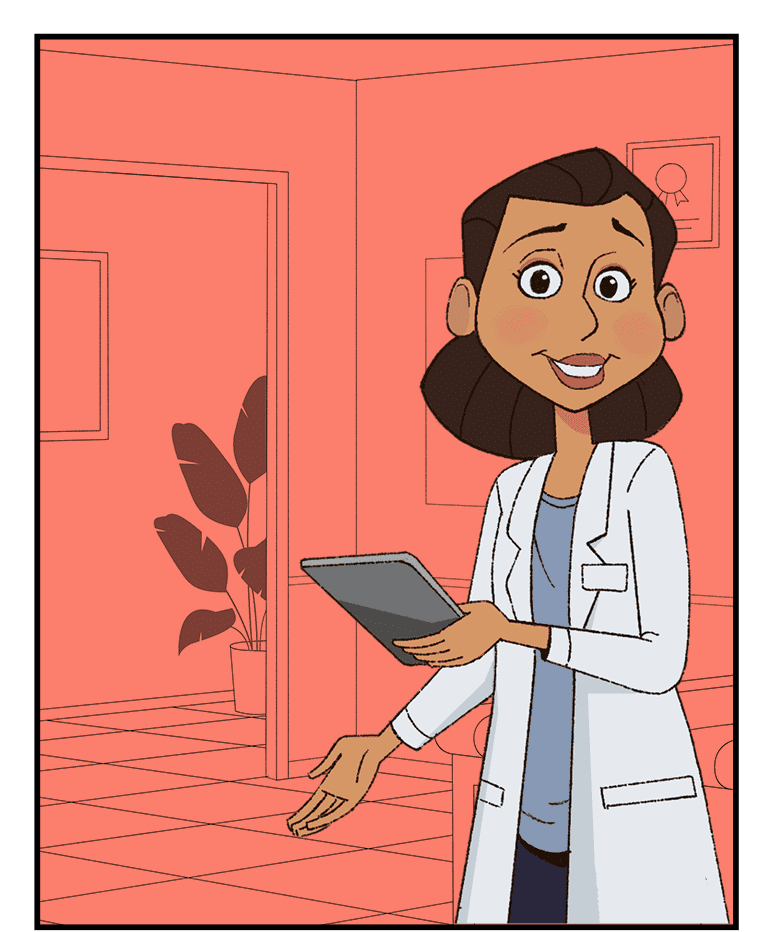





| Register to get bite-sized knowledge about eosinophilic esophagitis (EoE). | Sign up now |








EoE is not a typical food allergy, like being allergic to peanuts or gluten. In a classical food allergy, the triggers are easily diagnosed with a history of severe allergic reactions. With food allergies, a person can experience hives and vomiting soon after eating. With EoE, however, reactions can be delayed for days, so it can be hard to pinpoint what's triggering them.
Foods can trigger EoE, and these can change over time. Your doctor might have you avoid foods that could be causing your symptoms.
A gastroenterologist can order specific tests to diagnose whether you actually have EoE. They specialize in conditions of the digestive tract, like EoE. A gastroenterologist can also recommend certain things that may help if you do have EoE.
These specialists can do the appropriate tests to see if you're having an allergic reaction to certain foods or substances and figure out what triggers to avoid. They'll also manage related problems like asthma, eczema, and allergic rhinitis.
The symptoms of EoE can be similar to other more common conditions, such as allergies or heartburn. In addition to food or medicine allergies, many people who have EoE also have dermatitis or asthma. EoE is often mistaken for something else because of overlapping symptoms. However, EoE is a different medical condition that needs to be treated differently.
Yes, infants and toddlers can have EoE. Because of the condition, they may refuse their food, which may result in poor growth, malnutrition, or weight loss. School-aged children can have reduced appetite, stomach pain, trouble with swallowing, or vomiting.
During the past 26 years, doctors have seen more and more cases of EoE, so awareness is growing. Approximately 1 in 2000 people in the U.S. live with EoE.
For some people with EoE, the right approach includes both changes in diet and medicines. Doctors use different medicines to treat EoE, including medications to treat acid reflux, or certain kinds of steroids to treat inflammation in your esophagus. In certain cases of EoE, biologics given by injection may be used for appropriate patients. In certain severe cases, a nonpharmacological dilation procedure can be used.
The more you understand, the better you'll be able to communicate with those helping you.
Select a medical term from the dropdown menu:
Allergen
A normally harmless substance, such as pollen or foods, that causes the immune system to overreact.
Allergist/Immunologist
A doctor who specializes in treating allergic disorders and diseases involving the immune system.
Allergy
An abnormal immune response to substances, including food, pollen, or insect stings.
Biopsy
A small tissue sample that's taken from the esophagus, stomach, or small intestine during an upper endoscopy. A doctor examines the sample under a microscope.
Dysphagia
Difficulty or discomfort swallowing liquid or solid food.
Elimination diet
A diet in which specific foods are removed to decrease the chance of an allergic reaction. Patients with EoE are typically put on a diet that eliminates 6 foods: milk, soy, eggs, wheat, peanuts/tree nuts, and fish/shellfish.
Endoscope
A tube with a light and a camera on the end of it that is used to view the esophagus, stomach, and other parts of the digestive system. Endoscopes usually contain a biopsy port for the collection of tissue samples during procedures.
Endoscopy
An endoscopy is a medical procedure where a flexible tube containing a light source and a camera lens is passed down the esophagus so a doctor can see if the esophagus is inflamed. Performing an upper endoscopy with biopsies of the esophagus is necessary to diagnose EoE.
Eosinophil
A type of white blood cell that is part of the immune system and helps to fight off certain types of infections. Your blood and/or tissues may have a high level of eosinophils as the result of an allergic response.
Eosinophilic esophagitis (EoE)
A chronic immune condition of the esophagus. Elevated eosinophils in the esophagus can cause inflammation. This inflammation can lead to symptoms of EoE.
Esophagus
The esophagus is the muscular tube that connects the back of your mouth to your stomach.
Food impaction
When food gets stuck in the esophagus, it can cause a medical emergency. Be sure to let your doctor know if this occurs.
Gastroenterologist
A doctor who specializes in treating diseases of the digestive system.
Inflammation
Swelling of a tissue that's part of the body's response to injury, irritation, or damage. Inflammation can occur anywhere in the body and from many different causes.
Registered dietitian
A licensed professional who specializes in food nutrition plans. A registered dietitian creates a special diet using your allowed foods, determines appropriate food substitutes, and points out what ingredients to look for when choosing what you eat.
Stricture
Narrowing of the esophagus.
It can be hard to find the right words and remember what to ask during your limited time with your doctor. So write down questions as you think of them so you'll have them handy during your next appointment. Here are some helpful questions you can use to open up the conversation with those helping you manage your EoE.


Getting in touch with the right support groups is a great way to get valuable information and make helpful connections. Stay up to date on the latest news and stay connected by using these resources:
The American Partnership for Eosinophilic Disorders (APFED) educates, advocates, advances research, and connects patients for peer support. Connect to people in APFED's online community, EOS Connections, on the Inspire Network at APFED.inspire.com.
Campaign Urging Research for Eosinophilic Disease (CURED) is a not-for-profit foundation dedicated to those living with EoE and other eosinophilic gastrointestinal diseases. CURED is committed to raising funding to aid research and increase awareness of this complex group of diseases. Visit CUREDfoundation.org.
Links to third-party websites are provided as resources and Takeda is not responsible for their content.
